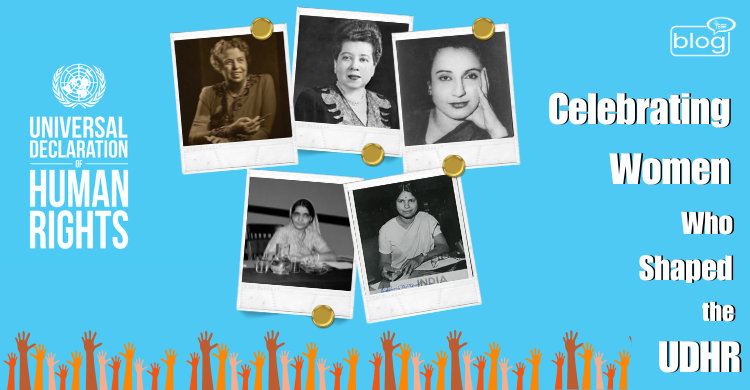The people of Earth adopted the Universal Declaration of Human Rights (UDHR) on December 10, 1948. This declaration was one of the turning points in human history and human rights. It was not just a document but a promise to every person on Earth. It declared that every human, regardless of age, gender, caste, religion, orientation, or race, deserves dignity, freedom, and equality.
However, unlike men, women participated behind the scenes to achieve such critical gains, most of the time going unnoticed. It was not only that they helped shape this instrument-they gave it life. It was ensured through their labor that it would speak to all, particularly those women long left out of the conversation.
Eleanor Roosevelt
Eleanor Roosevelt was the chairperson of the UDHR drafting committee. She was one of the few who truly embodied its spirit and essence. Her approach to leadership was all about connecting with others, understanding their perspectives, and building bridges between different views.
Eleanor was deeply convinced that human rights should transcend mere words on a page—they need to resonate deeply with actual individuals. She poured her heart into ensuring that the declaration was relatable and could be embraced by everyone, not just politicians or academics. “Where, in the end, do universal human rights begin?” she pondered. Her message remains as relevant today as ever, reminding us that real change starts with each of us.
Minerva Bernardino
Minerva Bernardino, a fiery delegate from the Dominican Republic, refused to settle for anything less than equality. She insisted that the UDHR include the phrase “the equality of men and women” in its preamble.
For Minerva, this wasn’t just symbolic—it was deeply personal. Coming from a world where women were often invisible in public life, she knew how important it was for future generations to see their worth reflected in global principles. Her persistence ensured that gender equality became a cornerstone of the declaration.
Begum Shaista Ikramullah
Pakistani Begum Shaista Ikramullah infuses much-needed interest and clarity into marriage rights legislation here. She was the principal architect of Article 16. The article says, “Right to marry and start a family: Men and women have the right to marry, and they enjoy equal rights in marriage, during marriage and at its dissolution.”
Shaista’s advocacy was based on an understanding of the cultural realities. She wanted the UDHR to protect women from practices such as child marriages, dignity, and choice. A reverberation of this continued long after her lifetime, as struggles for marital rights continue to this day across several parts of the globe.
Hansa Mehta
Hansa Mehta of India left her mark on the UDHR in a powerful yet understated way. She noticed that Article 1’s original wording read, “All men are born free and equal.” Hansa pushed it to change to “All human beings are born free and equal.”
It may seem like a small edit, but it changed everything. This simple shift in language made the declaration truly inclusive. Thanks to Hansa, the UDHR belongs to everyone, not just men.
Lakshmi N. Menon
Lakshmi Menon, another brilliant voice from India, was a fierce critic of colonialism. She believed that no culture or system should excuse the denial of basic rights. Her focus was clear: human rights must apply to everyone, everywhere.
Lakshmi’s determination helped ensure the UDHR could be a tool for liberation, not just lofty ideals. Her work reminded the world that human rights cannot be compromised, even in the face of political or cultural differences.
Why Their Contributions Still Matter
They are not just writing yet another document; much beyond that, they are changing the world. Every word in the UDHR bears the testimony of their experiences, struggles, and hopes for a future better than the present. Indeed, this work forms the foundation of countless movements that strive for gender equality, justice, and freedom.
While celebrating Human Rights Day, we are responsible for continuing to fight for the ideals each of them stood for. Their courage and vision remind us that progress is possible only if we make it happen.
To read more blogs like this, click here.
Writer
Fardeen Bin Abdullah
Intern, Content Writing Department
YSSE.

